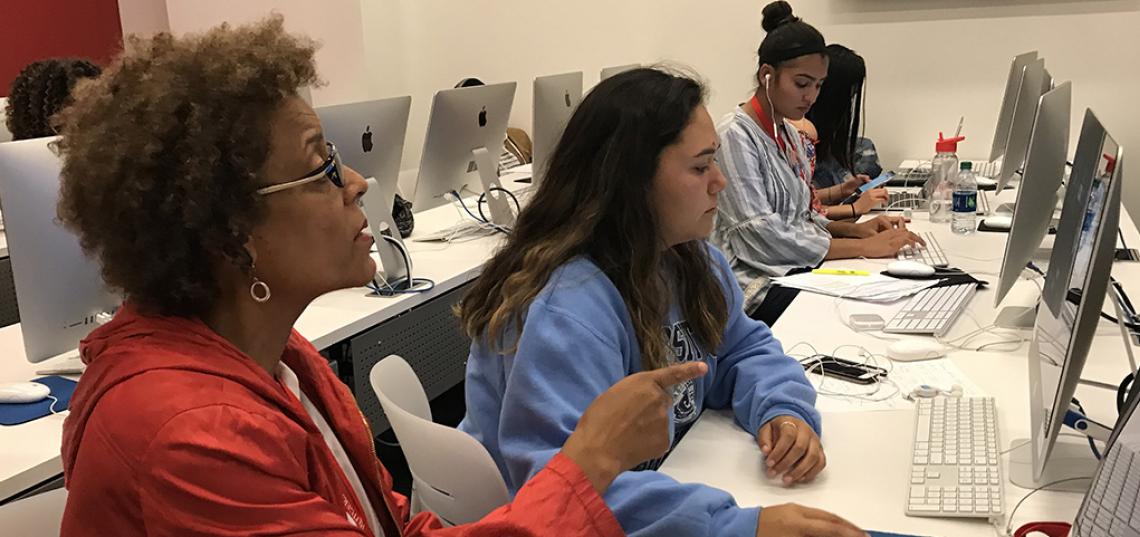
UPDATE: On August 16, 2018, the Gannet Foundation announced it has awarded a $2,500 grant to the Boyd Journalism Workshop. Read the full story in The Asbury Park Press.
This summer, thirteen New Jersey high school students attended the 2018 Hugh N. Boyd Journalism Diversity Workshop. The workshop is a 9-day intensive journalism and digital media training program run by the Director of the program and Part-Time SC&I Faculty member, Karyn D. Collins, who is also a freelance journalist and adjunct at William Paterson, Seton Hall and Bloomfield College, and the Associate Director, Melissa Cornick, a veteran television producer as well as an adjunct at Columbia University, Fordham and Adelphi.
The Boyd Workshop is based at SC&I’s Department of Journalism and Media Studies and aims to teach the basics of print and digital newsgathering.
“The workshop is designed to be an intensive boot camp. It’s designed to strengthen the skills that the students have in terms of journalism, as well as to give them an intro to other techniques and aspects of journalism that they may not be experienced in like video editing, and creating and running a blog. So, it’s a combination of trying to introduce them to new things like working on stories and producing in general,” Collins said about the goals of the workshop.
The workshop is open to rising high school sophomores, juniors, and seniors. Applicants are required to write essays that discuss diversity and explain what they hope to gain from the program.
“One of the unique things about our program is that our students attend on full scholarships. We know that it’s a lot of expense on our end, but we don’t want any students to not be able to participate because they can’t afford it. Everything is included, from room and board to pizza parties and t-shirts,” Collins said.
This year’s workshop had many interesting sessions added to it, Collins said. “We had a night session with the Poynter Institute; they sent a representative. They are working on a pilot program to teach young journalists on fact-checking, so we were part of that pilot program which is very exciting.”
With regard to the work the students did, Collins said, “We tried to put more emphasis and time toward doing videos and editing because we find that a lot of students don’t get that in their high school learning. We did it before but we’re adding more time to it. We actually started working with the students before they came to campus at the beginning of July through email, asking them to start generating stories and our Associate Director actually spoke to them via phone call, helping them with their story creation.”
The workshop also had many guest instructors such as Associate Professor Esther Dillard from Bloomfield College in Bloomfield, New Jersey, who was a prominent instructor on video editing throughout the workshop.
“Well, I hope that they get a sense of how the process works. Sometimes, I have a session like this and it goes smoothly, quickly, and easily, and sometimes, there are issues when it comes to technology but that’s just how the process works, even in real life. I hope that they at least get the mainframe of understanding on how to edit, how to put a story together, and how to incorporate images into a piece,” Dillard said about what she hopes the students learned from her.
This year, the most anticipated part of the workshop was the New York City trip to visit NBC, Bloomberg, and other places. The students spent the afternoon doing multiple journalistic activities.
“Even though we’re close to NYC, a lot of them have never been before. NBC had a fantastic day planned for the kids, actually, they did a panel and then they set up to do one-on-one mentoring with the kids. They asked for the bios of kids ahead of time and paired them up with the people there.” Collins said about the field trip.
According to Collins, the Hugh N. Boyd program was originally created in the 1970s. It was founded at Rider University and was spearheaded by the late Philadelphia Daily News Editor Chuck Stone. The program moved to Monmouth University in the late 1980s and remained there till the early 2000s but was dormant for nine years. Collins revived the program as a part of her master’s thesis at Rutgers and the program remains here for its third year.
